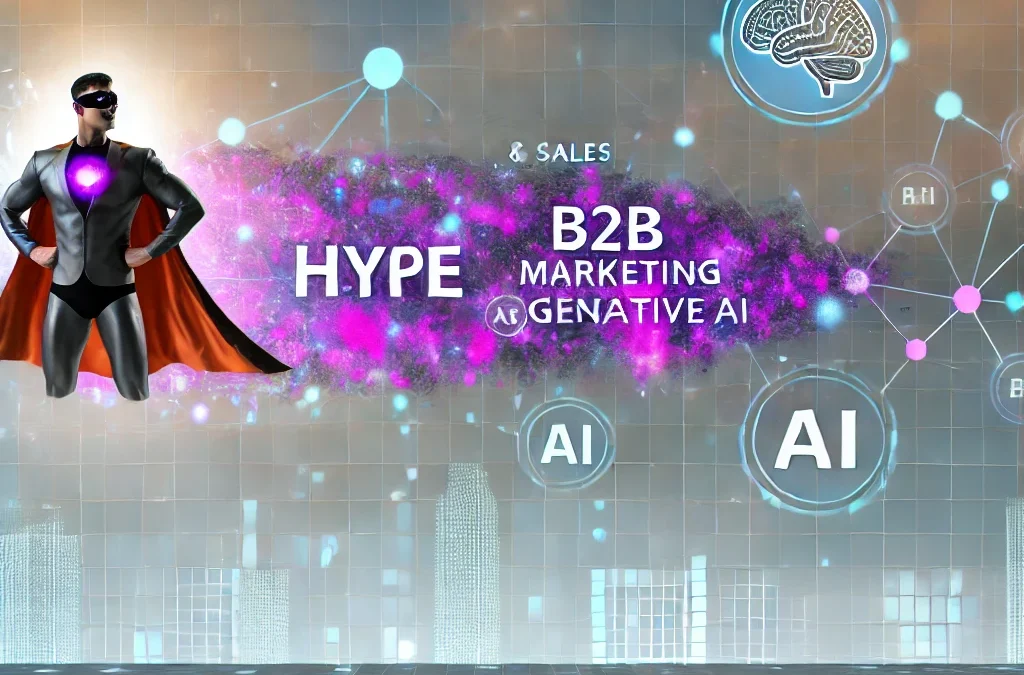B marketing and sales professionals, embracing generative AI (GenAI) technologies is a game-changer. Right, this isn’t new and it kinda sounds like all the other hype you’ve heard.
The article “Cutting Through the Hype: Generative AI Adoption in B2B” dives deep into the current state of GenAI in B2B contexts, dissecting both opportunities and hurdles faced by enterprises. This overview is pivotal for B2B marketers and salespeople who must understand the technology’s potential and the complexities of its implementation.
The Promise and Reality of Generative AI Adoption in B2B
Generative AI presents an enticing proposition: enhanced productivity, improved decision-making, and cost efficiencies. According to Rain Group, 72% of sales teams already leverage AI for content creation, employing it for initiatives like blog posts, articles, and social media content. GenAI’s ability to streamline content generation and personalize marketing efforts can vastly increase customer engagement. Yet, despite these advantages, widespread adoption faces significant stumbling blocks.
The main challenge isn’t just technical but cultural and operational. The hype surrounding AI has created unrealistic expectations, often leading to disillusionment when these technologies do not deliver immediate and transformative results. As McKinsey highlights, only 11% of enterprise organizations have successfully deployed an AI solution, illustrating the gap between AI enthusiasm and practical implementation.
Key Statistics and Analysis
To appreciate GenAI’s role in B2B, consider the following important data points:
- Content Creation: 58% of marketers report higher performance as a key benefit from using GenAI in content creation.
- Customer Engagement: 67% of sales teams use AI to develop personalized follow-up emails and outreach messaging, emphasizing enhanced communication effectiveness.
- Efficiency: 50% of respondents acknowledge cost efficiencies as a top advantage, reducing the need for human labor and compressing content production times.
- Adoption Gaps: 85% of sales professionals have not received formal training on using AI in their roles, showcasing a significant training gap that impedes effective AI use.
The Importance of Getting AI Right for B2B Marketers and Salespeople
B2B marketers and sales professionals must internalize several critical lessons from the GenAI adoption narrative:
1. Realistic Expectations and Strategic Vision
One of the primary issues with AI adoption is the disparity between expectations and reality. While AI offers significant potential, it requires strategic vision and nuanced understanding to achieve meaningful results. C-suite executives need to recognize that immediate ROI and rapid business transformation are not realistic without foundational changes in personnel and processes.
2. Training and Skill Development
Effective AI utilization hinges on upskilling. Despite acknowledging AI’s importance, only a minority of companies have invested adequately in training. Bridging this knowledge gap is crucial for turning theoretical AI benefits into tangible business outcomes.
3. Data Infrastructure and Quality
The efficacy of AI tools is fundamentally tied to the quality and robustness of data. Robust data management and analytics capabilities are essential for accurate AI deployment. Investments should prioritize systems that support data aggregation, cleaning, and analysis to inform AI models effectively.
4. Strategic, Not Just Tactical, Implementations
AI adoption should not be about chasing the latest trends but aligning technology with business needs strategically. AI applications must enhance the speed, accuracy, and quality of outcomes in critical business scenarios. For instance, Symplexity.AI emphasizes the need for customized AI models tailored to specific business requirements, ensuring relevance and maintaining data security.
Recommendations for Enhancing AI Adoption in B2B
- Invest in Training: Prioritize comprehensive training programs to equip your workforce with necessary AI skills. Consider forming partnerships with institutions that specialize in AI education.
- Develop a Robust Data Strategy: Ensure your data infrastructure is capable of supporting AI tools. Clean, high-quality data is a non-negotiable requirement for successful AI implementations.
- Custom Solutions Over Generic Tools: Embrace customized AI solutions that align with your specific business requirements. Off-the-shelf solutions might offer quick fixes but lack the depth and customization necessary for substantial impact.
- Focus on Ethical and Responsible AI Use: Establish clear policies and guardrails to ensure that your AI use is ethical and responsible, minimizing risks related to bias and data security.
Conclusion
The journey from AI skepticism to full-scale deployment is fraught with challenges, but the rewards are substantial. Generative AI holds immense potential for transforming B2B marketing and sales, driving efficiencies, enhancing customer engagement, and fostering innovation. The key lies in navigating the adoption process with strategic intent, investing in the right skills, ensuring data quality, and embracing tailored AI solutions.
For B2B marketers and sales professionals keen on exploring how GenAI can revolutionize their operations, diving into the detailed insights and strategies in “Cutting Through the Hype: Generative AI Adoption in B2B” is essential for crafting a forward-looking and successful AI strategy.

